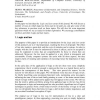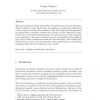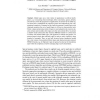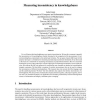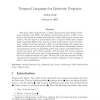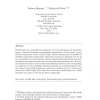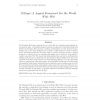70
Voted
LOGCOM
2008
15 years 2 months ago
2008
In this paper we introduce the Logic and Law corner of this journal. We will discuss a number of ways in which logic has been used in AI and Law, and give some of the key referenc...
122
Voted
JLP
2006
15 years 2 months ago
2006
This paper presents a modular framework for the specification of certain inductivelydefined coalgebraic types. Modal logics for coalgebras of polynomial endofunctors on the catego...
132
Voted
KI
2008
Springer
15 years 2 months ago
2008
Springer
Abstract. Modal logics see a wide variety of applications in artificial intelligence, e.g. in reasoning about knowledge, belief, uncertainty, agency, defaults, and relevance. From ...
106
Voted
JIIS
2006
15 years 2 months ago
2006
It is well-known that knowledgebases may contain inconsistencies. We provide a measure to quantify the inconsistency of a knowledgebase, thereby allowing for the comparison of the...
103
Voted
JUCS
2008
15 years 2 months ago
2008
Abstract: This paper describes a Java-based framework for developing componentbased software systems supporting adaptation with logic laws and considering component interactions as...
95
Voted
JSYML
2008
15 years 2 months ago
2008
. We give a novel application of algebraic logic to first order logic. A new, flexible construction is presented for representable but not completely representable atomic relation ...
88
Voted
JOLLI
2008
15 years 2 months ago
2008
While monadic second-order logic (MSO) has played a prominent role in model theoretic syntax, modal logics have been used in this context since its inception. When comparing propos...
146
Voted
JOLLI
2008
15 years 2 months ago
2008
This paper adds temporal logic to public announcement logic (PAL) and dynamic epistemic logic (DEL). By adding a previous-time operator to PAL, we express in the language statemen...
125
Voted
JAPLL
2006
15 years 2 months ago
2006
Hybrid logics are a principled generalization of both modal logics and description logics, a standard formalism for knowledge representation. In this paper we give the first const...
143
Voted
CORR
2007
Springer
15 years 2 months ago
2007
Springer
The Semantic Web drives towards the use of the Web for interacting with logically interconnected data. Through knowledge models such as Resource Description Framework (RDF), the S...
